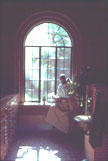“And since this is so, let grace unite your thought and affection to [God], while you strive to reject all minute inquiry into the particular qualities of your blind being or of his. Leave your thought quite naked, your affection uninvolved, and your self simply as you are, so that grace may touch and nourish you with the experimental knowledge of God as he really is. In this life, this experience will always remain dark and partial so that your longing desire for him be ever newly enkindled. Look up joyfully, then, and say to your Lord, in words or desire:
That which I am, I offer to you,
O Lord, for you are it entirely.
Go no further, but rest in this naked, stark, elemental awareness that you are as you are.”
—Privy Counsel, Ch. 1
I think I have ended up quoting the first chapter of Privy Counsel in its entirety. Each and every word explodes with meaning and power. I am in awe of the tremendous gift of each of these words.
In contemplative prayer, we reject all “minute inquiry” into the qualities of the self or the qualities of God. This is not introspection, not study, not discursive thinking at all. There is just the “blind,” “experimental” knowledge of God’s being, and ours. What thinking arises is “naked,” by which I think the author means that thought arises and passes away without attachment or aversion. Thought emerges in awareness and then returns to the void without comment or judgment on our part, a minute quality of our own “blind” being which we observe with never-before-seen clarity.
The author advises that this experience is always dark and partial until we enter completely into the beatific realms in the Life Beyond this one, and his explanation for this is that the partialness keeps us motivated to come back for more. While the author does not mention “love” in this passage, I think the analogy of human love is appropriate here. Part of the great mystery of human love is that no matter how many years we spend with our beloved, we always only see them partially, we never gaze into their own “blind being,” and so while we crave unity with the beloved, there always remains this fascinating, impenetrable separation. The tension between our union and our separation gives our love relationships a kind of dynamic energy that is some small way reflects the dance of Love between the contemplative practitioner and the Divine Being.
This may be best demonstrated in the author’s prayer, which hints at both unity and separation: “That which I am, I offer to you, O Lord, for you are it entirely.” While we experience our “difference” from God, we offer it back not because we have anything to give, but because what we are was never ours to begin with, but rather a manifestation and gift of the Divine Goodness in the first place.
This place of dark, energetic, wordless tension is where we dwell in contemplative prayer, a “naked, stark, elemental awareness that you are as you are.”







